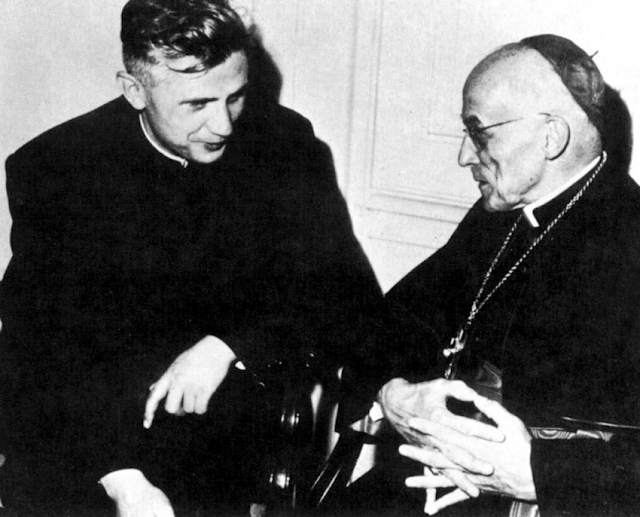And darkness descended over the Council and the Church, 60 years ago today.
THE HOLY OFFICE HAS DONE SEVERE DAMAGE TO THE CHURCH
60 years ago: Cardinal Frings angrily attacks the Roman Curia
60 years ago today, Cardinal Frings of Cologne attacked the Holy Office head-on. Its director was practically seething: "Altissime", in the loudest voice, he had to protest against the insults from his authority. What happened in the council hall?
The number of anecdotes from the Second Vatican Council (1962-1965) is legion. One incident in particular has stuck in the collective memory because it reflects the polarity of the largest church gathering of the 20th century like no other. The main character was a predecessor of Cologne Cardinal Rainer Maria Woelki: Josef Frings (1887-1978), who was actually known as a people-oriented conservative.
On November 8, 1963, 60 years ago, Frings attacked the Holy Office, the forerunner of the Vatican religious authority, head-on and in a furious Latin speech. Its head, Alfredo Ottaviani (1890-1979), literally seethed: "Altissime", i.e. with the loudest voice, he had to protest against the insults from his authority.
It was possibly the decisive moment of the Council: The Archbishop of Cologne, 76 years old, almost blind, stepped up to the lectern - only to massively violate a centuries-old unwritten law in the middle of St. Peter's Basilica: The Holy Office is not to be criticized!
Serious accusations against the Holy Office
And Frings went into overdrive: the highest Vatican authority, successor to the medieval Inquisition, had caused serious damage to the church and was a nuisance for non-Catholics. Orthodox scholars would be condemned without being heard; Theological books would be banned without giving reasons. Applause in the council hall - and the snubbed head of the authorities Ottaviani visibly struggled to keep his composure.
The attack was twofold: It was also and above all aimed at Ottaviani's claim to decide with his theological commission on the legality and illegitimacy of the council's decisions - that is, to place the Curia above the authority of the council and the assembled bishops of the universal church. It was this threat of incapacitation of the Council Fathers that led Frings - one of the assembly's twelve presidents - to launch his unprecedented attack on the Vatican's traditional surveillance practices.
Cathcon: Cardinal Ottaviani always was clear that it was the publication he was worried about and said he could not see into people's head. Pope Francis operates on the principle of thought crime, as can be seen from the treatment of traditionalists.
Ironically, the Cologne cardinal owes his theological reversal in no small part to his young council advisor, who was able to distinguish himself as one of the spearheads of the "progressives" at the time: Joseph Ratzinger, the later Pope Benedict XVI. (2005-2013). Ratzinger had written Frings's first progressive manifesto, a lecture on "The Council and Modern Thought", with which Frings shone in Genoa in 1961 and which also won him the attention of Pope John XXIII. (1958-1963) provided a big building block.
The fresh wind under the Council pope also made a new Frings. And he also felt support from Paul VI, Pope from March 1963: the day before the furious speech battle, he had assured the German bishops in an audience that he considered reforms in the church to be indispensable.
The writer Luise Rinser (1911-2002) (Cathcon: Father Rahner's girlfriend) explained Frings' combative change with the loss of his eyesight. That makes him more alert, also for “the emergency calls of the time.” The cardinal himself said about his self-image that the bishops in the council were not those who obeyed, but rather legislators together with the pope himself. It shouldn't be surprising that "some people who didn't let anyone outdo them in their obedience to the Roman Pope" now represent "progressive and liberal views" in this situation.
The attack on 8 November caused a furore. After the deliberations, the Council Fathers crowded round the two bars in the side aisles of St Peter's Basilica to review the incident. The "Deutsche Tagespost" wrote martially of a "clash of the titans", and the Essen diocesan newspaper "Ruhrwort" compared the duel with the biblical tradition "when Paul confronted Peter in Antioch in front of everyone". Frings himself played down the event: Ottaviani, who was almost the same age, had later come up to him at the bar and said to him in French: "Nous sommes freres" (we are brothers); after all, they both basically wanted the same thing.
It is not without historical charm that 60 years after Frings and his advisor Ratzinger tore down the wall of silence over the Curia, Pope Francis is now making a new attempt at reform with the World Synod. And once again, at least subliminally, it is also about the question: Who governs the Church? The Pope alone? Pope and bishops in collegiality - or in "synodality", as the buzzword is these days? Or the Roman apparatus?
Cathcon: The forces released on this day have done infinitely more damage to the Church than the Curia was supposed to have done. They eventually destroyed the Pontificate of the cleric jointly responsible for unleashing the whirlwind, Joseph Ratzinger.










.jpeg)

Comments